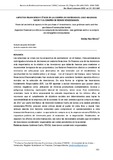Aspectos financieros y éticos en la compra de inversiones: caso goldman sachs y la compra de bonos Venezolanos
Fecha
2018Autor
Palabras Clave
Goldman Sachs, PDVSA, Inversiones socialmente responsablesGoldman Sachs, PDVSA, Socially responsible investments
Metadatos
Mostrar el registro completo del ítemResumen
Las empresas se crean con la perspectiva de permanecer en el tiempo. Esta permanencia está ligada a la toma de decisiones en materia financiera. En finanzas una de las decisiones más importantes es la relativa a las inversiones que deberán hacerse para mantener e incrementar la riqueza de sus propietarios. Los factores financieros clásicos a considerar al momento de seleccionar una alternativa de una inversión son el rendimiento, la oportunidad de los rendimientos y el riesgo. Con el trascurrir del tiempo, estos factores financieros tFacesradicionales han evolucionado para considerar también aspectos éticos y morales en la selección de inversiones. De esta forma se originan las Inversiones Socialmente Responsables (ISR). Las ISR apuntan a excluir inversiones que posean claros criterios negativos como utilización de técnicas productivas contaminantes, nocivas y peligrosas industrias; explotación laboral de menores, entre otras. Este movimiento orientado hacia la ética empresarial ha cobrado importancia en los últimos años, al reconocer que el cumplimento de objetivos sociales son determinantes para lograr la sustentabilidad de la empresa y de la sociedad. Es en este contexto que la compra en mayo de 2017 por parte del Banco de Inversión Goldman Sachs de bonos a la estatal petrolera venezolana PDVSA, provocó serias críticas desde el punto de vista ético y moral. Este articulo aborda tres factores esenciales para comprender el cuestionamiento a esta transacción financiera, a saber: la operación de compra en sí, la empresa emisora PDVSA y la coyuntura política de Venezuela para el momento de la negociación. Finalmente, se exponen los efectos de esta transacción, así como las necesidades actuales que en materia de inversiones socialmente responsables aún están pendientes en la sociedad.
Información Adicional
| Otros Títulos | Financial and ethical aspects in the purchase of investments: case goldman sachs and the purchase of venezuelan bonds - Aspectos financeiros e éticos na compra de investimentos: caso goldman sachs e a compra de obrigações venezuelanas |
| Correo Electrónico | gleidyrios@gmail.com |
| Editor | SaberULA |
| ISSN | 2244-7482 |
| Resumen en otro Idioma | Companies are created with the perspective of remaining in time. This permanence is linked to the decision making in financial matters. In finance, one of the most important decisions is related to the investments that must be made to maintain and increase the wealth of their owners. The classic financial factors to consider when selecting an alternative of an investment are the yield, the opportunity of the yields and the risk. With the passage of time, these traditional financial factors have evolved to also consider ethical and moral aspects in the selection of investments. In this way, Socially Responsible Investments (SRI) are originated. The ISR aims to exclude investments that have clear negative criteria such as the use of polluting productive techniques, harmful and dangerous industries; labor exploitation of minors, among others. This movement oriented towards business ethics has gained importance in recent years, recognizing that the fulfillment of social objectives are crucial to achieve the sustainability of the company and society. It is in this context that the purchase in May of 2017 by the Goldman Sachs Investment Bank of bonds to the Venezuelan state oil company PDVSA, caused serious criticism from an ethical and moral point of view. This article addresses three essential factors to understand the questioning of this financial transaction, namely: the purchase operation itself, the issuing company PDVSA and the political situation of Venezuela at the time of negotiation. Finally, the effects of this transaction are exposed, as well as the current needs that are still pending in society regarding socially responsible investments. |
| Colación | 151-168 |






